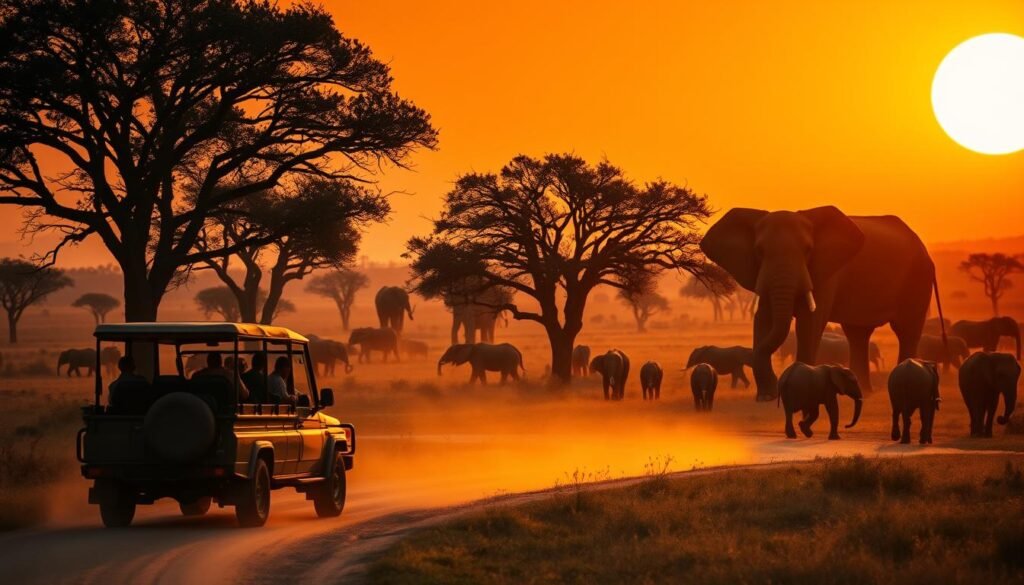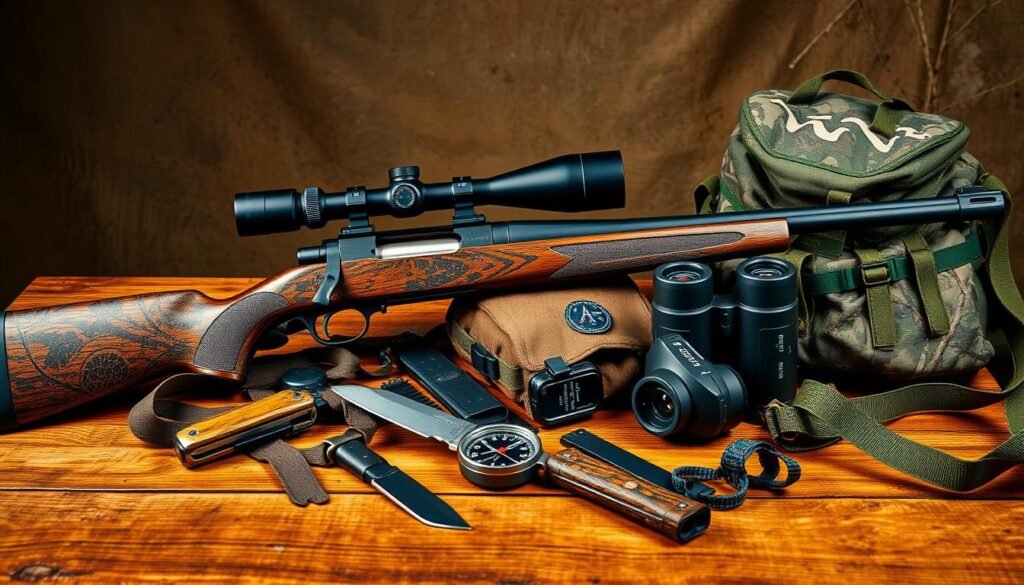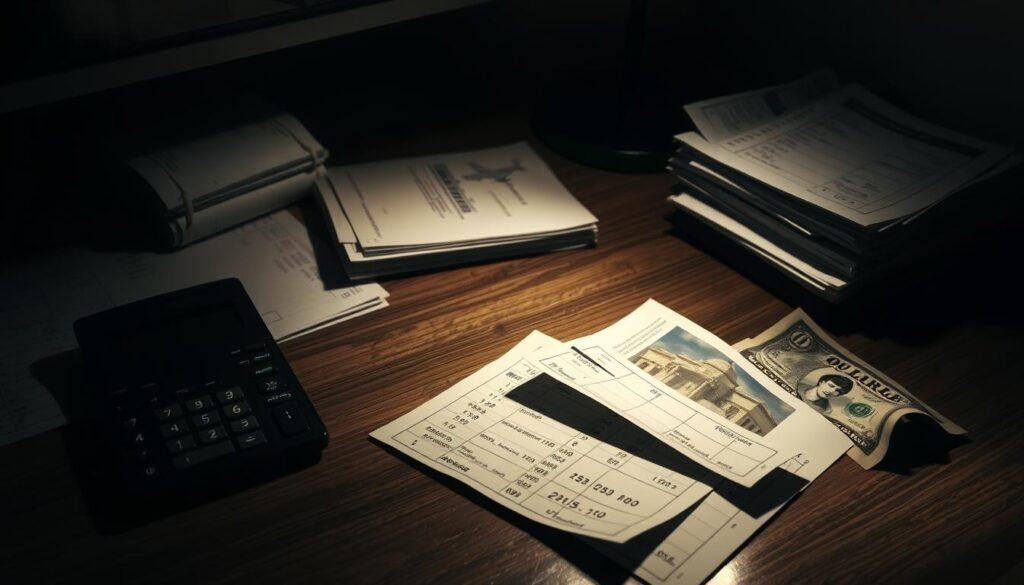African hunting safaris are exciting for hunters. But, the cost can be a big factor in planning. The price varies based on the hunt type, location, and services needed. Knowing the costs is key to a great trip.

When thinking about an African hunting safari, it’s important to know the costs. This includes the hunt price, travel, trophy fees, and equipment. Understanding these helps hunters plan and budget for a memorable trip.
Introduction to African Hunting Safaris
African hunting safaris offer a unique chance to hunt in a beautiful continent. There are many types of hunts, like big game and plains game. The cost varies, but with planning, hunters can find a safari that fits their budget and is unforgettable.
Key Takeaways
- Understanding the cost of hunting in Africa is essential to planning a successful trip
- African hunting safaris offer a unique and exciting experience for hunters
- The cost of hunting in Africa can vary greatly depending on several factors
- Research and planning are crucial to finding a safari that fits your budget
- African hunting safaris provide a range of experiences, from big game to plains game hunts
- Hunters should consider additional costs, such as travel expenses and equipment requirements
Understanding African Hunting Safaris: An Overview
African hunting safaris are a thrilling adventure for hunters. They offer a variety of hunting experiences, from big game to bird shooting. Each type comes with its own challenges and rules.
Popular spots for hunting include South Africa, Namibia, and Tanzania. These places are home to famous animals like lions, elephants, and buffalo. Hunters can choose from rifle or bow hunting, each with its own rules.
- Big game hunting: for species like lions, elephants, and buffalo
- Bird shooting: for species like pigeons, doves, and guineafowl
- Plains game hunting: for species like impalas, kudus, and wildebeests
Knowing the different hunting experiences and popular places is key to a great safari. By picking the right hunt and location, hunters can have a memorable adventure.
How Much Does It Cost to Hunt in Africa: Base Price Breakdown
Planning a hunting trip to Africa means understanding the hunting costs. The base price for a safari varies a lot. It depends on the hunt type, location, and services needed. Expect to pay a daily rate, which can be from a few hundred to several thousand dollars.
A cost breakdown of an African hunting safari includes the daily rate. This covers the hunt, accommodations, and meals. Other costs like trophy fees, transportation, and equipment rental are added to the base price. Here are some key expenses to consider:
- Daily rate: $500-$5,000 per day
- Accommodations and meals: $100-$500 per day
- Trophy fees: $500-$5,000 per animal
- Transportation: $500-$2,000 per trip
It’s important to research and understand the hunting costs and base price of a safari. This ensures a successful and enjoyable trip. By considering these expenses and making a detailed cost breakdown, hunters can plan better for their African adventure.
Essential Travel Expenses for African Hunting
Planning an African hunting safari means thinking about travel costs. These expenses can quickly add up. Hunters should include them in their budget. Travel expenses change based on the season, where you start, and where you go.
International flights are a big part of the cost. Prices change with the season and where you leave from. Hunters should look for the best deals. Also, accommodation costs are important. You need to think about where you’ll stay and eat during your trip.
Some key travel expenses to consider are:
- International flight costs
- Accommodation and lodge fees
- Local transportation expenses
It’s important to plan and budget for these costs. This way, your hunting trip will be both successful and fun.
Understanding and planning for these travel expenses is key. Hunters should look for the best deals on international flights and accommodation costs. This will help make your hunting trip the best it can be.
Trophy Fees and Animal Packages
Planning an African hunting safari means understanding trophy fees and animal packages. Trophy fees are the costs for hunting certain animals. Animal packages are deals for hunting a set of animals for a fixed price. These costs vary based on the safari company and the hunt type.
Hunters should look closely at the trophy fees and packages from their safari operator. This ensures they get the most value for their money. Some operators offer hunting packages that include fees, lodging, and guides. These packages can make planning easier and more affordable.
Here are some key factors to consider when evaluating trophy fees and animal packages:
- Trophy fees for specific animals, such as lions or elephants
- Animal packages that include multiple species, such as a “plains game” package
- Hunting packages that include accommodation, guiding, and other services
Understanding the different trophy fees and packages helps hunters make better choices. Whether you want trophy fees for a specific animal or a full hunting package, research is key. This way, you can find the best option for your needs and budget.
Professional Hunter and Guide Fees
Planning an African hunting safari means thinking about the costs of hiring a professional hunter and guide. These experts are key to a successful and safe hunt. Their fees vary by day, depending on the hunt’s location, type, and expertise needed.
A professional hunter charges a daily rate for their expertise and support. These guide fees can be from a few hundred to several thousand dollars a day. Knowing what your guide’s daily rates cover is important to fairly pay them.
Here are some key factors to consider when calculating the costs of hiring a professional hunter and guide:
- Daily rates: These can range from $500 to $2,000 per day, depending on the location and type of hunt.
- Tipping guidelines: It’s customary to tip your guide and staff 10% to 20% of the total daily rate.
- Additional staff costs: You may need to pay for additional staff, such as trackers or skinners, which can add to the overall cost.
Understanding the costs of hiring a professional hunter and guide helps plan your African hunting safari. This way, you can ensure a successful and enjoyable experience.
Equipment and Gear Requirements
When planning an African hunting safari, it’s key to think about the hunting equipment and gear requirements. This ensures a safe and successful hunt. The equipment needed varies based on the hunt type and terrain. So, it’s important to research and prepare well.
Hunters should focus on essential items like rifles, ammo, and optics. They also need specialized gear for Africa, such as clothing, footwear, and insect repellent. Rental options are available for some equipment. This can save money and be convenient for those not wanting to buy their own gear.
Some important things to consider for hunting equipment and gear include:
- Firearm and ammunition selection
- Optics and sighting systems
- Camouflage and hunting clothing
- Footwear and trekking gear
- Insect repellent and sun protection
By choosing and preparing the right hunting equipment and gear requirements, hunters can have a great African hunting safari. It’s also wise to look into rental options for some equipment. This can help save money and make things easier.

Legal Documentation and Permits
Before starting an African hunting safari, knowing about legal documentation and permits is crucial. Hunting laws change a lot based on the country and type of hunt. Hunters must follow all rules to avoid problems.
To have a great hunting trip, getting the right permits and licenses is key. You need to know the hunting regulations of your destination country. This includes what animals you can hunt, when you can hunt them, and what licenses you need.
Some important things to think about for legal documentation and permits are:
- Getting the right hunting licenses and permits
- Knowing the hunting regulations of your destination country
- Following all laws and rules
By understanding and following the needed legal documentation and permits, hunters can have a successful and fun African hunting safari.
Hidden Costs and Additional Expenses
Planning an African hunting safari means looking at hidden costs and extra expenses. These can add up fast. Insurance requirements are key for unexpected events or accidents. Hunters should get insurance for emergency medical evacuations, trip cancellations, and damage to equipment.
Also, think about the cost of trophy shipping and taxidermy. These services can be pricey. Make sure to budget for them so your trophies are handled and shipped right. Don’t forget to plan for an emergency fund for any unexpected events or accidents.

Some important hidden costs and additional expenses to keep in mind are:
- Trophy fees and animal packages
- Professional hunter and guide fees
- Equipment and gear requirements
- Travel expenses, such as flights and accommodation
By understanding these hidden costs and additional expenses, hunters can plan better. This way, they can avoid surprises and make sure they’re covered with the right insurance requirements.
Conclusion: Planning Your African Hunting Budget
Starting your African hunting safari adventure means you need to plan your budget well. The costs can add up quickly. But, by knowing what to expect, you can make a budget that covers everything.
Think about the base price of the hunt, travel costs, trophy fees, and what equipment you need. Planning your budget carefully helps you avoid surprises. This way, you can enjoy the hunt more.
A well-planned safari is not just fun. It also helps local communities and conservation. With good planning and a budget, your trip will be unforgettable. It will also support the wildlife habitats.
FAQ
What are the different types of African hunting experiences?
Africa offers many hunting experiences. You can hunt big game or shoot birds. Each hunt has its own special features and needs.
What makes African hunting unique?
African hunting is special because of the diverse wildlife and challenging terrain. Hunters also get to experience local cultures. They can see many species and meet local communities.
What are some popular hunting destinations in Africa?
Popular places for hunting in Africa include South Africa, Namibia, Tanzania, and Zambia. These countries offer different hunting experiences and a wide variety of wildlife.
What is the base price for a hunting safari in Africa?
The cost of a hunting safari in Africa varies a lot. It depends on the hunt type, location, and services needed. Daily rates can range from a few hundred to several thousand dollars.
What are the essential travel expenses for an African hunting safari?
Key travel costs for an African hunting safari include flights, accommodation, and local transport. Hunters should compare prices to find the best deals.
What are trophy fees and animal packages?
Trophy fees are for harvesting specific animals. Animal packages are set prices for hunting certain animals. Hunters should know what their safari operator offers to get the best value.
What are the fees associated with professional hunters and guides?
Professional hunters and guides are key to a successful hunt. Their fees are a big part of the safari cost. Hunters should understand the daily rates and tipping to fairly compensate their guides.
What equipment and gear are required for an African hunting safari?
Hunters need the right equipment and gear for Africa. This includes essential hunting tools and gear for African conditions. They might need to rent or buy gear, depending on the hunt and terrain.
What legal documentation and permits are required for an African hunting safari?
Hunters must have the right permits and licenses for Africa. They should know the hunting laws and regulations in their destination country. The requirements vary by country and hunt type.
What are the hidden costs and additional expenses associated with an African hunting safari?
Hidden costs include insurance, trophy shipping, and taxidermy. Hunters should also plan for emergencies. These extra expenses should be included in their trip planning to understand the total cost.
